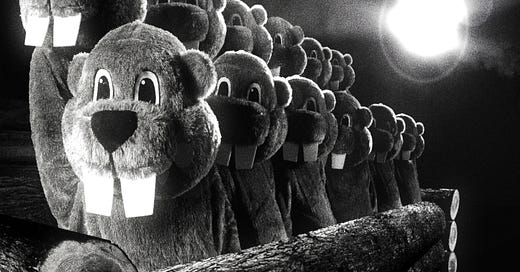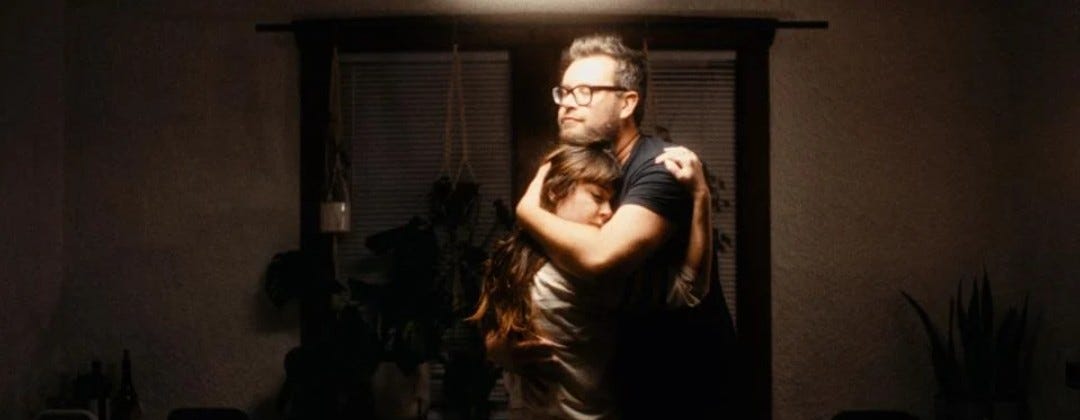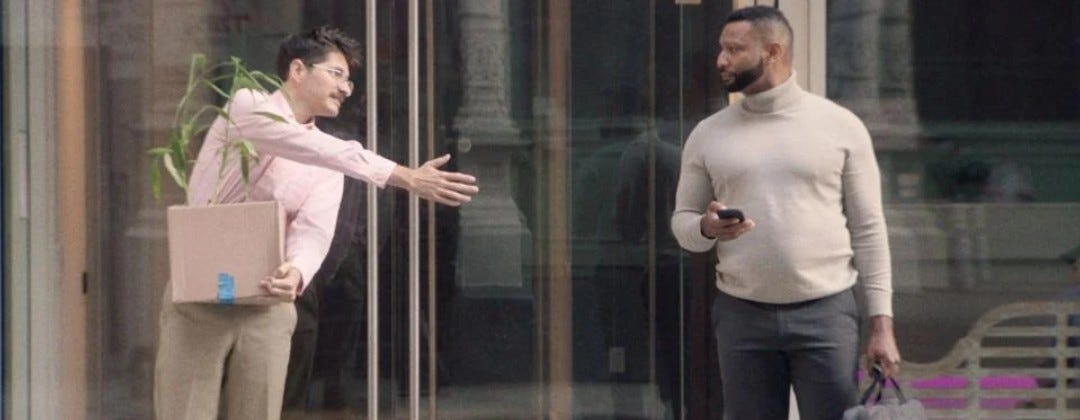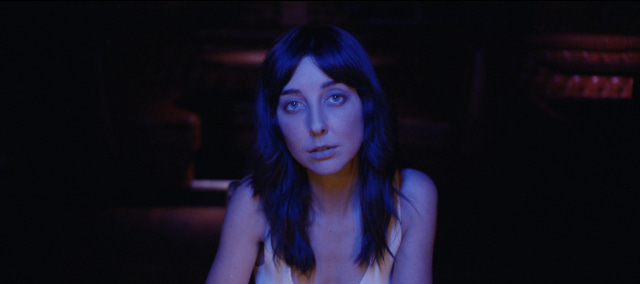Indy Film Fest: American Spectrum Features
Reviews of "Hundreds of Beavers," "In a Good Way," "Free Time" and "Fuzzy Head" playing at IFF.
For Indy Film Fest schedule and tickets, please click here.
Film Yap is a reader-supported publication. To receive new posts and support my work, please consider becoming a free or paid subscriber.
Hundreds of Beavers
Springing from the minds of Wisconsin-based filmmakers co-writer/editor/director Mike Cheslik and co-writer/producer/star Ryland Brickson Cole Tews, “Hundreds of Beavers” is an endless yet endlessly creative ode to “Looney Tunes” and video games.
Tews plays drunkard, 19th-century Applejack salesman Jean Kayak whose business gets destroyed by our titular beavers. In order to regain stability and exact revenge against his critter foes, Kayak opts to become a fur trapper.
Kayak attempts to sell his wares to a curmudgeonly, chaw-chewing merchant (Doug Mancheski) and begins mooning over his furrier daughter (Olivia Graves). The merchant makes the following abundantly clear to Kayak: he can only have his daughter’s hand if he provides him with hundreds of beaver pelts. It’s on and often plays out like “Donkey Kong.”
“Beavers” is black and white and largely dialogue-free. It’s often uproariously funny and Tews is a deft enough physical comedian that he’d likely do Bruce Campbell and Jim Carrey proud. What’s here is inspired … there’s just an abundance of it. I can’t help but feel the film would play better at 78 minutes as opposed to its current length of 108. An argument could be made that Cheslik and Tews vary their gags and scenarios enough that the picture earns its runtime, but I’d counter it’s too much of a good thing.
In a Good Way
It’s obvious that documentarian-turned-feature filmmaker Joshua LaBure and his cinematographer/co-director Zachary Gutierrez had seen and were inspired by Richard Linklater’s “Before” trilogy in the making of “In a Good Way.”
David (producer Ryan Balas) and Margot (Audrey Kovár) are a married couple in the midst of a separation. She stayed in Chicago where she’s working as an actress and cam girl. He’s a documentarian who’s moved to Omaha, Neb. to shoot and edit a film. The two are reunited when she visits for the weekend to see if their relationship is sustainable.
“In a Good Way” isn’t necessarily in a bad way, but it doesn’t reach the heights of Linklater’s heralded trilogy … admittedly a high bar. It’s far more sexually explicit than those pictures. Balas and Kovár kinda look like the love children of celebrities (him: Seth Rogen and James Corden; her: Meg White and Billie Lourd) so when their characters get frisky it’s sorta freaky. I did find it refreshing that Balas’ naked body more closely resembled my own as opposed to Brad Pitt’s. I was also left with the question, “Who goes down on someone with glasses on?”
If you have a high tolerance for hipsterdom (these two are the epitome of the “House Hunters” meme in which two layabouts have an exorbitant budget) and mumblecore flourishes, “In a Good Way” will likely appeal to you. I don’t know what the movie is ultimately trying to say, but I was happy enough to hear it out.
Free Time
It took me a while to vibe with what it is “Free Time” is doing, but once I did I was handsomely rewarded by a comedy with incisive ideas about youth … whether misspent, waning or both.
Drew (Colin Burgess) is a dweeby dude in his late 20s. He hastily decides to quit his unfulfilling office job assuming other opportunities are just around the corner … they aren’t.
Drew busies himself by sulking around the apartment he shares with his roommate Rajat (Rajat Suresh) much to the annoyance of Rajat’s girlfriend Kim (Holmes). He figures this newfound time can be dedicated to the band fronted by Michael (Michael Patrick Nicholson) in which he plays keys, but the group is moving in a new (read: keyless) direction. Romantic overtures Drew makes to old friend Laura (Rebecca Bulnes) and an acquaintance’s neighbor (Jessie Pinnick) land with a resounding thud.
“Free Time” as written and directed by Ryan Martin Brown is the personification of cringe comedy. I didn’t especially like Burgess’ Drew (frankly, I frequently wanted to shake the shit outta him), but I often found him humorous even if a lot of the laughs got caught in my throat.
The film takes an amusing and surprising turn in its final third, which I won’t spoil here. It also opens and closes with some bitchin’ late 1970s/early 1980s credits. If you can get on its wavelength (and are OK with cringey comedy), there’s certainly worse ways to spend your free time than with “Free Time.”
Fuzzy Head
I admire the emotional vulnerability shown by writer/producer/director/star Wendy McColm in getting “Fuzzy Head” to the screen. No film is easy to make and I suspect this one would’ve been especially difficult. I just wish it worked for me.
Marla (McColm) is on the run after the death of her mother (Alicia Witt). Both Marla and the authorities assume she ended her mother’s life, but who’s to be sure since Marla is an insomniac grappling with the childhood abuses she suffered at her mother’s hand.
“Fuzzy Head” is a work of abstract filmmaking that bounces back and forth between the past and present. (Cassidy Butler plays Young Marla.) I was often as confused as Marla in regards to what was real and what wasn’t in the world of this movie. (I’m sure this was purposeful on McColm’s part, but I mostly just found it perplexing.)
“Fuzzy Head” easily sports the most famous cast of any of the American Spectrum feature offerings with Witt, Richard Riehle (he was the Jump to Conclusions Mat guy in Mike Judge’s “Office Space”), Fred Melamed (the Coen brothers’ “A Serious Man”) and Rain Phoenix (she’s Joaquin’s sister!). They all act well (as does McColm) - I just had trouble engaging with the story they were telling.
Comparisons have been drawn between McColm’s moviemaking and the films of David Lynch. To be honest, I’m not much of a Lynch guy and have always responded better to his more commercial efforts, i.e. “Blue Velvet,” “Twin Peaks” and “Mulholland Drive.” Lynch once said, “To understand my work you must follow the emotion because if you follow the buttermilk you’ll end up going to the dairy.” I had troubles following the emotion in “Fuzzy Head” and wound up in Wisconsin with the “Hundreds of Beavers” boys.











